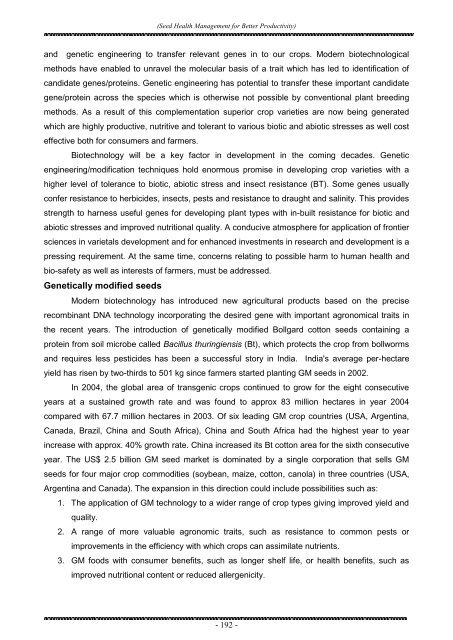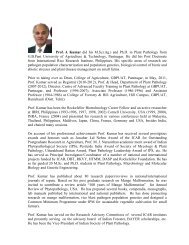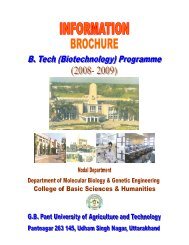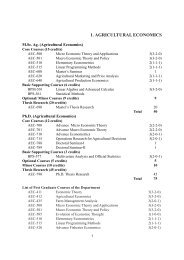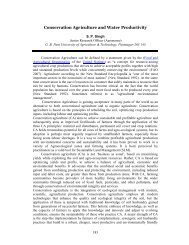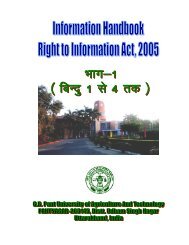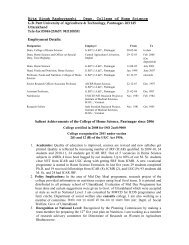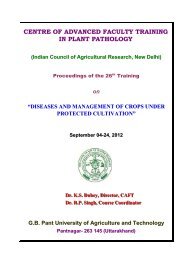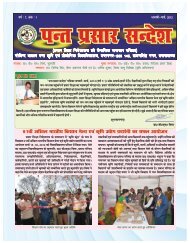Seed Health Management for Better Productivity - Govind Ballabh ...
Seed Health Management for Better Productivity - Govind Ballabh ...
Seed Health Management for Better Productivity - Govind Ballabh ...
You also want an ePaper? Increase the reach of your titles
YUMPU automatically turns print PDFs into web optimized ePapers that Google loves.
(<strong>Seed</strong> <strong>Health</strong> <strong>Management</strong> <strong>for</strong> <strong>Better</strong> <strong>Productivity</strong>)and genetic engineering to transfer relevant genes in to our crops. Modern biotechnologicalmethods have enabled to unravel the molecular basis of a trait which has led to identification ofcandidate genes/proteins. Genetic engineering has potential to transfer these important candidategene/protein across the species which is otherwise not possible by conventional plant breedingmethods. As a result of this complementation superior crop varieties are now being generatedwhich are highly productive, nutritive and tolerant to various biotic and abiotic stresses as well costeffective both <strong>for</strong> consumers and farmers.Biotechnology will be a key factor in development in the coming decades. Geneticengineering/modification techniques hold enormous promise in developing crop varieties with ahigher level of tolerance to biotic, abiotic stress and insect resistance (BT). Some genes usuallyconfer resistance to herbicides, insects, pests and resistance to draught and salinity. This providesstrength to harness useful genes <strong>for</strong> developing plant types with in-built resistance <strong>for</strong> biotic andabiotic stresses and improved nutritional quality. A conducive atmosphere <strong>for</strong> application of frontiersciences in varietals development and <strong>for</strong> enhanced investments in research and development is apressing requirement. At the same time, concerns relating to possible harm to human health andbio-safety as well as interests of farmers, must be addressed.Genetically modified seedsModern biotechnology has introduced new agricultural products based on the preciserecombinant DNA technology incorporating the desired gene with important agronomical traits inthe recent years. The introduction of genetically modified Bollgard cotton seeds containing aprotein from soil microbe called Bacillus thuringiensis (Bt), which protects the crop from bollwormsand requires less pesticides has been a successful story in India. India's average per-hectareyield has risen by two-thirds to 501 kg since farmers started planting GM seeds in 2002.In 2004, the global area of transgenic crops continued to grow <strong>for</strong> the eight consecutiveyears at a sustained growth rate and was found to approx 83 million hectares in year 2004compared with 67.7 million hectares in 2003. Of six leading GM crop countries (USA, Argentina,Canada, Brazil, China and South Africa), China and South Africa had the highest year to yearincrease with approx. 40% growth rate. China increased its Bt cotton area <strong>for</strong> the sixth consecutiveyear. The US$ 2.5 billion GM seed market is dominated by a single corporation that sells GMseeds <strong>for</strong> four major crop commodities (soybean, maize, cotton, canola) in three countries (USA,Argentina and Canada). The expansion in this direction could include possibilities such as:1. The application of GM technology to a wider range of crop types giving improved yield andquality.2. A range of more valuable agronomic traits, such as resistance to common pests orimprovements in the efficiency with which crops can assimilate nutrients.3. GM foods with consumer benefits, such as longer shelf life, or health benefits, such asimproved nutritional content or reduced allergenicity.- 192 -


